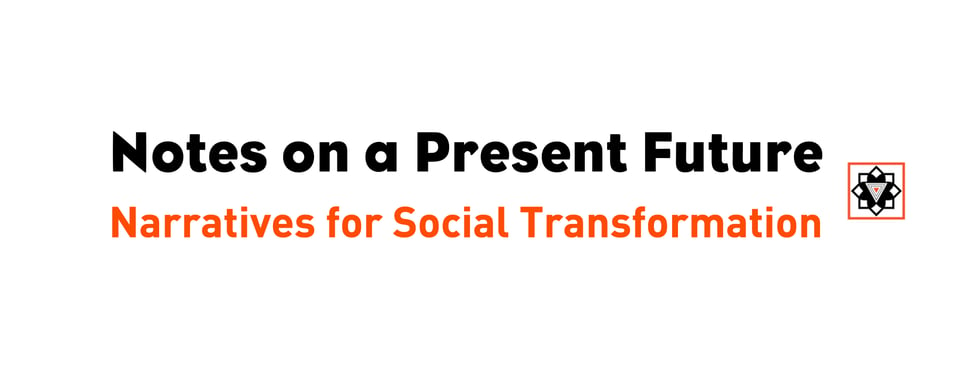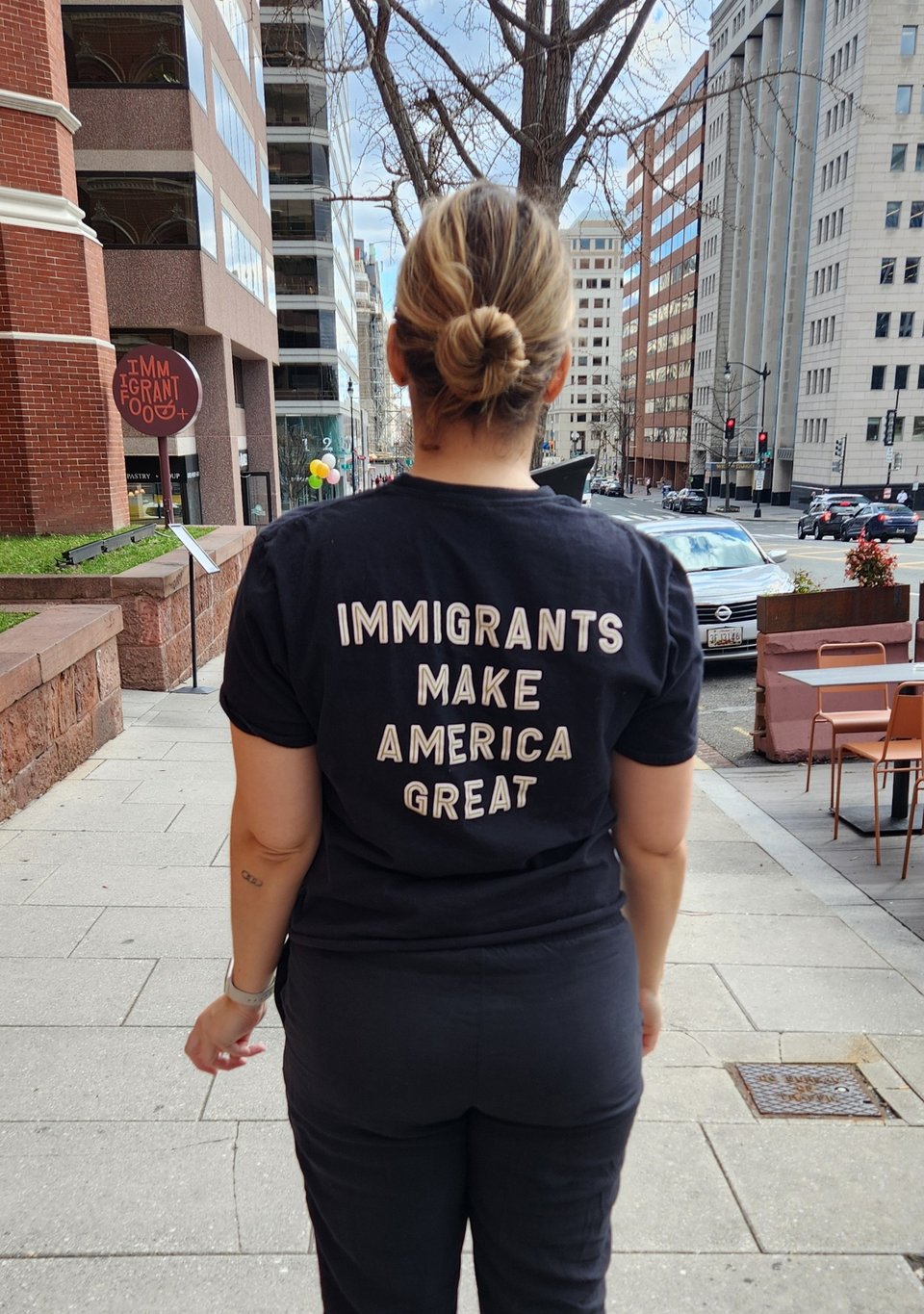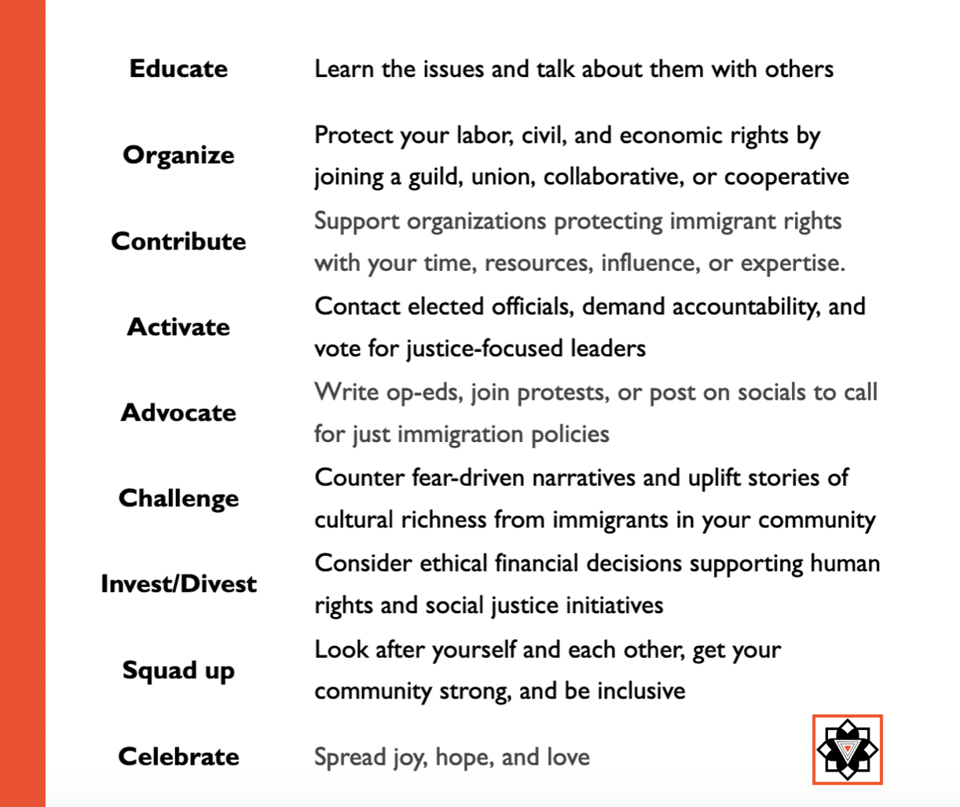The Voice of Many Colors

Welcome back to Notes on a Present Future. If this is your first time here, this newsletter uplifts the stories and the work of people shaping the world to build just futures now.
What’s inside
1. A note from my desk
2. Updates (mine and, more importantly, yours)
3. Reading, watching, listening
4. Stay in touch and collaborate with us.

A note from my desk
Ten years ago, the documentary Who Is Dayani Cristal? premiered in theaters and on streaming. The film tells the story of a migrant who died crossing into the Sonoran desert, exploring the reasons that pushed him from his home and pulled him to the U.S. on a foot journey designed to be one of the most dangerous in the world. His story served as a microcosm of the challenges faced by millions worldwide who experience displacement each year – and is as pertinent now as it was a decade ago.
I served as the social impact director and transmedia producer for the project. I partnered in 2008 with the film’s director Marc Silver on a community-centered storytelling project on the impact of borders on people and communities, from which WIDC emerged. It was a deep dive into the rights issues, policies, systems, and narratives around migration, which over the last fifteen years has become one of the pillar issues of my social transformation work: Since then, I’ve worked on a number of strategic media, narrative, and technology projects on migrant rights, for issues from integration and welcoming to artist-led advocacy.
I’m proud of this work. Each individual project forwarded rich narratives and effective calls to action, with leadership from people in affected communities and support of established movements and networks. And these networks are strong and committed.
Meanwhile, as drivers of migration such as climate change, atrocity, and economic disparities intensify, global resistance to inclusive, compassionate policies for immigrants, refugees, IDPs, and asylum seekers continues to grow, pushing further toward exclusion. This month’s elections in the UK and France – where a left wing coalition came together in three weeks and organized an electoral win, hopefully inspiring us all – may signal a rejection of deeply xenophobic immigration policy there. But the situation for displaced people around the world appears more dire than at any point in the last fifteen years, including the U.S.
While current U.S. immigration policy has largely been chaotic, there are potentially even larger threats ahead. Project 2025 is a series of draconian policy proposals set out by far right organizations that would, if enacted, drastically reshape all aspects of the U.S., including its immigration system. The plan weaponizes its portrayal of immigrants as security risks and economic burdens in a contentious election year. It includes mass deportations, arbitrary detention, disregard for legal protections and proposals to deploy troops for widespread immigration enforcement. All of these potentially increase already devastating conditions for immigrants, and threaten families, communities, and the economy.
In the face of this threat, we need cohesive, navigable, and compassionate policies. We need vision. It is crucial to take action to defend ourselves, our communities, and our collective futures. Here’s a playbook:

Now, to the updates…
Updates
Mine:
Project updates: My company, Center for Transformational Change, is now a core organizational collaborator of the MERL Tech Initiative (MTI), which supports the responsible design, use, and governance of digital technologies and digital data to achieve better outcomes for people, communities and societies. The Center will focus on supporting work related to narrative change, social change, and innovation in participatory processes and methodologies for analysis, evaluation, and governance, including the role of technologies such as GenAI in engaging people to enhance understanding of the impact of social justice and international development programming.
In May, I traveled to South Africa for a board retreat for Electric South. I was there just ahead of the elections and while the ICJ decision came down, which created an atmosphere of palpable energy for national and global change and action. Sub-Saharan creatives and civil society figures are navigating this era in intriguing ways. Electric South’s tenth anniversary is next year, and I'm excited by the future of our organization – and also for the African ecosystem of immersive media artists and creative technologists.
In June, I spoke on two panels. The first, “The Power of Storytelling to Impact Culture” was for the Asian Women’s Giving Circle’s grantee-donor convening. The second panel, “Women and Leadership,” was for Vital Voices’ Global Ambassadors convening. Both organizations strengthen networks for women’s leadership and collaboration through resources, knowledge sharing, and mentorship.
New writing: No new writing this quarter – I’m working my way through some long form pieces, which I’ll tell you about on socials and in the autumn newsletter.
In the meantime, if you are looking for help in your writing, I can’t recommend my writing coach Tara Skurtu highly enough. She’s been a thought partner and champion, and your writing will benefit.
Yours:
To Save Us From Hell: Anjali Dayal and Mark Leon Goldberg have launched a fantastic new podcast about the latest news and happenings around the United Nations. Anjali and Mark are self-described veteran UN watchers, who analyze the discussions and debates driving the agenda at the UN — and “uncover some geopolitical intrigues along the way.” Mark has kindly extended a subscription discount to readers of this newsletter, so take a listen. (Also, Anjali is my niece and she makes me very proud.)
The Soil of Leadership: Britt Yamamoto has a new book called The Soil of Leadership about a leadership philosophy, grounded in introspection and commitment to purpose, that is deeply suited to our current era. I was happy to be an early reader and to give a testimonial for the project. It comes out on July 30 and is available for pre-order now.
Anticipation and Risk : Aarathi Krishnan has co-written a piece for the ODI Development Policy Review called “Anticipatory Development Foresight: An approach for international and multilateral organizations.” Aarathi is leading the development sector in deepening understanding of and facility with risk, anticipation, and strategic foresight, and this piece is an essential read for people in the sector.
Complicating Colonialism: The journal Coda, edited by Natalia Antaleva, has dedicated its latest issue to a great series on the ripple effects of colonialism in our present and future lives. I highly recommend taking an afternoon for a deep dive in the essays.
We are the Builders: Deepa Iyer has a new book coming out as part of her Social Change Map project series called We Are The Builders, for children and their caregivers navigating their places in changing their communities. The book is coming out in September 2024 and is available for pre-order now.
GenZ in Kenya: In the midst of protests in Kenya, the Nairobi-based organization Shujaaz has published a timely and comprehensive new report on youth perspectives on the finance bill at issue, governmental leadership, and hopes for the future. Important read for people striving to understand what’s at stake in these protests.
Retrofit Reimagined: The Birmingham U.K.-based organization Civic Square, founded and run by Imandeep Kaur, released a film ahead of the U.K.’s general election to urge the next government to embrace a community-driven retrofitting to lead climate efforts. The film is a great example of story-based community leadership on climate resilience and transformation.
King Coal: Elaine McMcMillion Sheldon made a beautiful, elegiac memoir film about Appalachia and its changing landscape, brought on by climate change and new visions for economic possibility. The film is available to stream on POV in the U.S.
Our Collapsing States: Jared Yates Sexton writes a fantastic blog called “Dispatches from a Collapsing State” with a companion podcast. This conversation with the writer Wajahat Ali lays out what it feels like to live in a dying empire and maps out the playbook for global authoritarian creep. It’s a compelling listen.
Changing the Immigration Narrative: Earlier this year, the organization Define American released new research and media guidance on how to tell authentic immigrant stories – very important always but particularly this election year, as I talked about above. If you’re centering immigration in your stories and projects, take a look at the guide. (DA has a few other guides and reports, such as this and this, to support your creative practice.)
Borderland: Pamela Yates and Paco de Onis of Skylight Pictures have made an urgent and compelling documentary called Borderland: The Line Within. The film traces, both literally and figuratively, how U.S. immigration enforcement agencies have created a “border industrial complex,” a system that exploits immigrants’ status vulnerabilities to turn into corporate profit. This is an essential watch during this election season (and beyond). The film is being self-distributed. Sign up to host a screening.
Reading, watching, listening
What I’m reading:
Show Me The Money: As I’ve written in this newsletter before, I enjoy reading the newsletter “Just Enough Internet,” by Rachel Coldicutt of Careful Trouble. Rachel usually works on and writes about technology and ethics, but in May, she wrote a piece about money and its scarcity in progressive spaces. Her piece is about the UK, but this is an essential read for any funders and investors anywhere who are sitting on resources instead of spreading them to progressive enterprises as we go through this era of precarity. As Rachel says, “It’s hard to imagine a better future and build alternatives when you’re worrying about the bills.” Spread the love.
Data Workers: The organization DAIR has built a platform for an amazing set of essays and videos by data workers from around the world. These workers – who are too often overlooked in the AI industry – have conducted their own research and written in their own voices about their communities and the context in which they perform their data work. This is great community-level participatory storytelling on AI ethics, governance, and labor – and the essays are a good read.
Brotherless Night: One of my favorite novels last year, Brotherless Night by V.V. Ganeshanathan, won the Carol Shields Prize this year. It’s a beautiful and poignant story of navigating and resisting a militarized society. If you haven’t read it yet, I highly recommend it.
With Darkness Comes Stars: Audrey Flack is a 92-year old artist and one of the original creators of the photorealist movement (after rejecting the world and artists of abstract expressionism). She’s written With Darkness Comes Stars, a memoir for the ages. If you love art, women artists, the struggles of women in art, or New York City, pick this one up.
What I’m watching:
Laapata Ladies: Fun, funny, feminist, and an ultimately sweet comedy of errors, this movie is a delightful watch.
Roger Federer at Dartmouth: Federer is the undisputed male GOAT of tennis. (Djokovic? Just no.) And he seems to be having even more fun in his post-retirement era. His recent honorary doctorate commencement speech at Dartmouth University is a breath of fresh air – and a good listen while we all contend with the state of the world.
What I’m listening to:
The Border Chronicle: Returning to the theme of immigration in the U.S., this podcast is a fantastic local exploration of the state of the U.S.-Mexico border. Hosted by two border journalists, the interviewees include activists, artists, journalists, and technologists, covering all aspects of migration and border culture. Pair this with their newsletter for a deep dive.
Kim Gordon: The fabulous Kim Gordon released The Collective, her second solo album, this past spring, and it’s a both a salve and a slash at our world. I’ve had it on weekly.
First dance, then dance, and then dance again: DJ Tasha Blank played a set she played recently for a group of folks she thought could use the release. In her mailing about it, she wrote: “Feels like a lot of humanity is ready to fight, run away or shut down right now. But the whole point is if we don't ::: if we actually meet the incessant pounding of this moment and surrender, life will shake up, empty out and reorganize our nervous system into the kind that can move through these times.” Yes.
So I will leave you for now to dance. Here’s her set.
See you in a few months.
In solidarity and joy,
Lina
To work with us: Center for Transformational Change
(We specialize in strategy, convening, and original productions related to social transformation across displacement, climate justice, equity, and cultural engagement)
To book me for speaking: My Chartwell Speakers Profile
To learn more about my work: www.linasrivastava.com
To support this newsletter, please visit this link and send it to your friends.
To ask to amplify your social transformation project, please email here
To reach me on social media: LinkedIn, Twitter, Bluesky, Instagram, Mastodon
P.S. The title of this Summer 2024 newsletter comes from a lyric written by Prince in his song “7”:
There will be a new city with streets of gold
The young so educated, they never grow old
And there will be no death, for with every breath
The voice of many colors sings a song that's so bold
Sing it while we watch them fall
All seven and we'll watch them fall
They stand in the way of love and we will smoke them all
With an intellect and a savoir faire
No one in the whole universe will ever compare
I am yours now and you are mine
And together we'll love through all space and time
So don't cry
You are on this list as a member of my community. If you would like to change how you receive this newsletter: Update your preferences or Unsubscribe from this list below.
Copyright 2024, Lina Srivastava. All rights reserved.